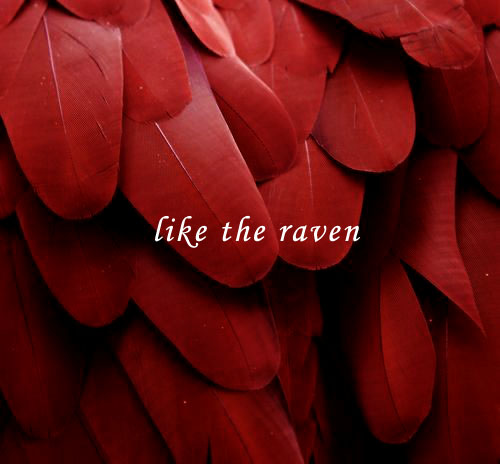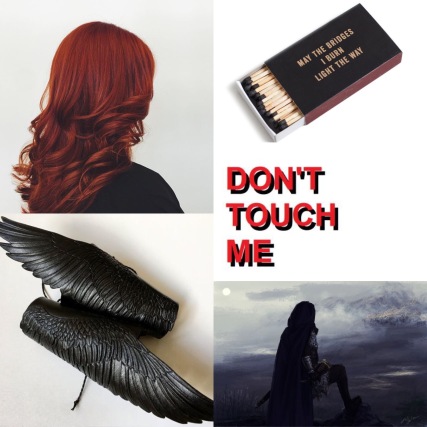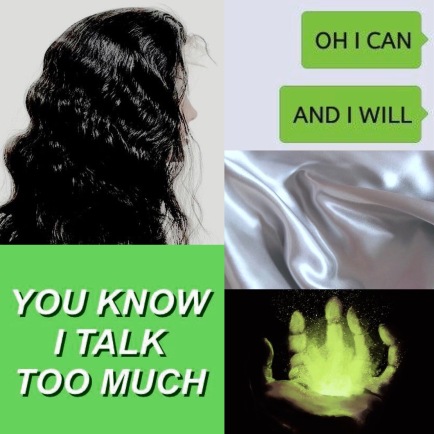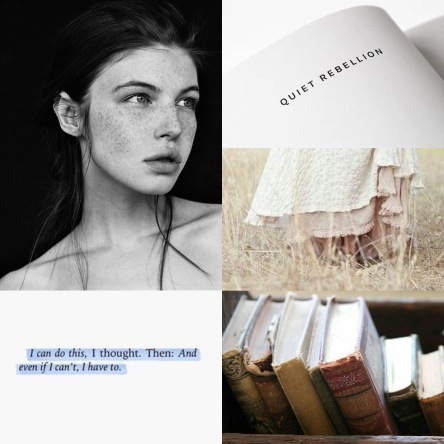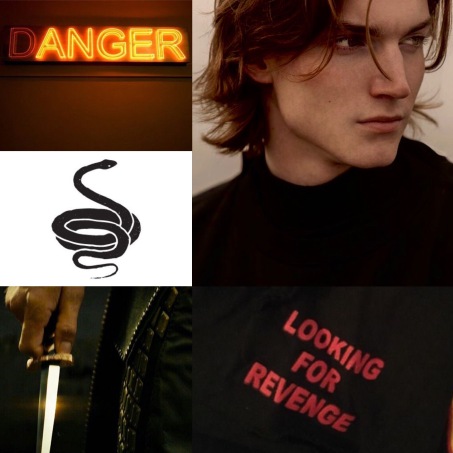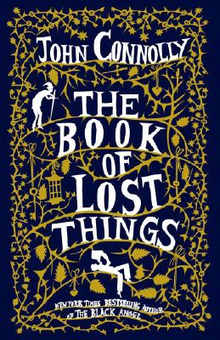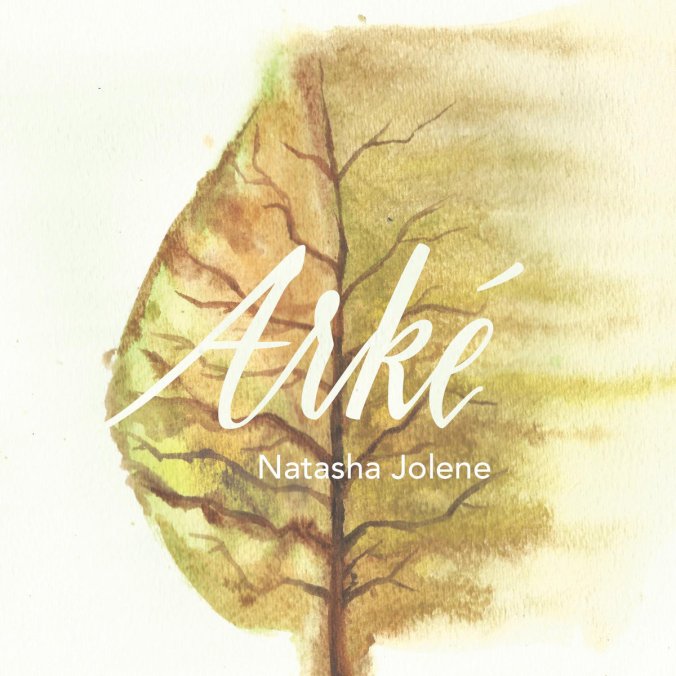
Let me preface this by saying I have never done an album review before–but also, I have never encountered an album quite like Arké by Natasha Jolene. I downloaded this album when it was available on Noisetrade, and I fell in love upon the first listen.
Arké is a seven song concept album that explores the story of humanity’s beginnings, through the book of Genesis, chapters two and three. Its characters and themes show just how much the things that started it all impact humans in the present-day world. The songs are fairly mellow, not over-imposing or in your face. They are soft, even in the moments of suffering and anguish that they portray. Natasha Jolene’s voice is melodic and smooth, and a perfect accompaniment to her lyrics and the tales behind them.
This album portrays its source material as widely applicable to the world at large, yet stays true to its roots. Within the music and words there is peace, heartbreak, doubt, regret, forgiveness, devastation, and hope. Arké is a wonder, and the only way I can express my sincere adoration for it is to show you what it contains that means so much to me.
1) Delight
And every morning dew brought a promise
That we would never have to leave
We sang our songs of breathless wonder
Til the skies filled with harmonies
The album begins in the Garden of Eden. Adam and Eve. This song embodies the notion of new life, the joy that the first man and woman must have felt in God’s presence. If I had to describe this song in one word, it would be bright. It serves as a perfect introduction, just as the world we live in was perfect when God first made it. It was good. This song is not loud or beaming, but peaceful. I can perfectly picture the sunlight on the leaves, and the couple dancing in the dawn, knowing God and knowing the land and all it had to offer. But as we all know, this delight was not to last.
2) Will
Eternal soul
You’ve seen what isn’t good
Now, nail yourself to the tree
By whose fruit you choose to exist
One of my favorite things on this album is how seamlessly each song leads into the next. The shift from Delight into Will is so well-done, and as the first note rings out, the listener just knows what has happened. This song, as far as I have been able discern, is told from the point of view of God, as He watches His children choose the forbidden fruit. And we are reminded (very cleverly by Natasha Jolene) through the lyrics, that God sees what they are about to do, what they have done, and what will come of it. The shifting verb tenses in the song remind us that God is all-knowing and ever-present. He sees what Adam and Eve have chosen, and He sees where it will bring them, and where it will bring the rest of humanity.
Another one of my favorite choices on the part of Natasha Jolene is her references to Jesus Christ, the Son of God, throughout this album. I’ve heard it said many times that if you don’t see Jesus in the Old Testament, you’re missing the point. And this song is one of those reminders–the idea that through this sin, Adam and Eve have set the wheels in motion. They have let sin fall on humanity, and, one day, the perfect sacrifice will come and be nailed to a tree for their sin, my sin, and your sin. This is such a powerful moment, because it shows Jolene’s ability to mean more than she says on the surface. Though those lines reference a punishment, the listener cannot help but be reminded of the One who will ultimately take the punishment that Adam, Eve, and all of us, deserve. The death of Jesus Christ is foreshadowed, and because of that mention, the listener is powerfully reminded of the hope that we have in Him. I cannot praise Natasha Jolene enough for this genius lyrical device that appears continually throughout the album, where, even in the moments of deep regret and suffering, there is still the thought of hope.
3) Young Wood
Then we heard your voice again
From a distance you said,
“Where are you?”
This song is quite simple, but it captures so much. The repetition of the line, “Where are you?” is so powerful. We know from the original chapters that it is God asking this question, but so often we as Christians will ask of God where He is. We need to be reminded that we were the ones who separated ourselves first. This song captures that separation, that shame, and that fear. Yet, this song is the calm before the storm.
4) The Dust
Who could love the dust?
Our naked souls are tainted now, and
Who could love the dust?
The mud we sling is us
This is, without a doubt, my favorite song on the album. The mark of a great concept album, to me, is when you can understand what has taken place in the story without any lyrics to tell you. When the shift from Young Wood to The Dust occurs, you can feel the transition–you can feel the Fall. You can feel that something has been gravely changed, that something will never be the same.
Natasha Jolene’s words are full of this knowledge, and in this song the curse is placed upon mankind. The realization of what has befallen Adam and Eve is poignant. Simply the way she sings the word “chaos” gives me chills, because it embodies the very real anguish of the moment. Ruin and death are the only fruit known to these characters now, and the reality of what has occurred finally crushes them. They cry out, “who could love the dust?” knowing deep inside that they are the dust and that nothing will ever be the same.
But, as Jolene is so clever, there is more to this question than ruin. Adam and Eve ask the question thinking that the answer is obvious–no one could love them anymore. They imagine the dust as the lowest of the low, unable to be saved or redeemed. But, as we know, this is not true. When I first listened to this song, that line hit me like a punch to the gut. Because there is just so much more behind those words than what Adam and Eve are saying in the moment. As Christians, we know the answer to that question. We know who could love the dust. The answer to that question is Jesus Christ.
This line calls back to the notion that first appeared in Will, the idea that even in a question pronounced with such hopelessness, in the answer and in the future, all is not lost. Jesus Christ did, does, and will love us, the dust. He loved the dust so much that He came and died for the dust. Jesus Christ, the perfect and spotless Lamb, died for the dust. If you take anything at all from this album please let it be that. The anguish expressed in these verses is not without a remedy. And so I praise Natasha Jolene again for telling this story as it should be told, because the most important thing she does in writing about this beginning is that she references its end. We know that though this tale began with pain, it all leads to Jesus Christ, the greatest of all endings.
5) Whose Voice
Who told you you were naked?
Who told you you were naked?
Who told you you were shameful?
Not I, child, not I
This next song contains questions with very different answers than the previous tracks. Again from the point of view of God speaking to His children, Adam and Eve are asked who they allowed to deceive them. Of course, we know the answer to these questions is Satan, the serpent and the first liar. But I want to point out something really profound I realized when I had showed this to a friend. My friend remarked on the lines above, specifically the question, “who told you you were shameful?”
Our conversation led me to really dwell on the idea that Satan was the one who told us that we were not enough. When God created all of this, He called it good. We were deceived to think less of ourselves than what God saw in us. Looking at our world today, I am astounded by the amount of things we see and are told that make us feel inadequate. Humanity struggles so much with depression and feeling as if we are not valued–it makes perfect sense that the reason sin entered the world was because we were convinced we were not good enough. We were told that we had not achieved enough, and despite the fact that the God of the universe wove them together with His very hands, the idea took root in Adam and Eve that they were not enough.
If you are reading this, I want you to know that God was not the one who told you that you are not good enough. Those voices are not from Him, and that is precisely what this song is saying. It is a haunting reminder of where one of humanity’s deepest insecurities came from. It encourages us to return to the One who made us, to the One who saw us and said that we were good.
6) When Love Subdues
But you stripped my flower of its leaves to cover your own shame!
You’ve reduced me to an ointment to numb the place where your side gapes
I interpret this song as the voice of Eve, reflecting on what has happened up to this point. She acknowledges, ” I do admit to frailty, I do admit to my mistakes.” There is hope in this confession. This song boasts that yes, we have made mistakes, but all is not lost. The conversation of love again reminds us of Jesus, and the promise of Him to come. Hopelessness and hope battle in this song, feeling the weight of the situation but also knowing that the Creator is a Father, and He is love. The knowledge of the love of God leads to strength. The softness of the melody here is calming and reassuring, because it reminds us of the declaration that when we are weak, He is strong.
7) Skins
This world is no longer glad to see me
And I’m no longer glad to see myself
The consequences of this choice are staggering
I need you; I need your help
The confession expressed in the previous song leads perfectly into the final track on the album–a cry for forgiveness. The acknowledgment that we have no control over this world, that we long for that original state of satisfaction and delight, and that that freedom is only attainable through God.
This song is a quiet meditation on our need for God, and the hope and peace we can have in His presence. It’s a perfect ending to the album, because it reminds us that no matter what we have done, no matter the poor choices we’ve made and their consequences, there is always room for us in God’s kingdom. All we have to do is make this same kind of realization–that we are broken and in need of help from the only One qualified to fix us–our Creator.
Arké is an album I will never forget. Every time I listen to these songs I am struck by their beauty and the message behind them. If you are looking for simple, lovely, and powerful Christian music, look no further. Natasha Jolene is brilliant, and I thank her sincerely for her hard work and for this wonderful album.
You can listen to Arké, and buy it here: https://natashajolene.bandcamp.com/album/ark
